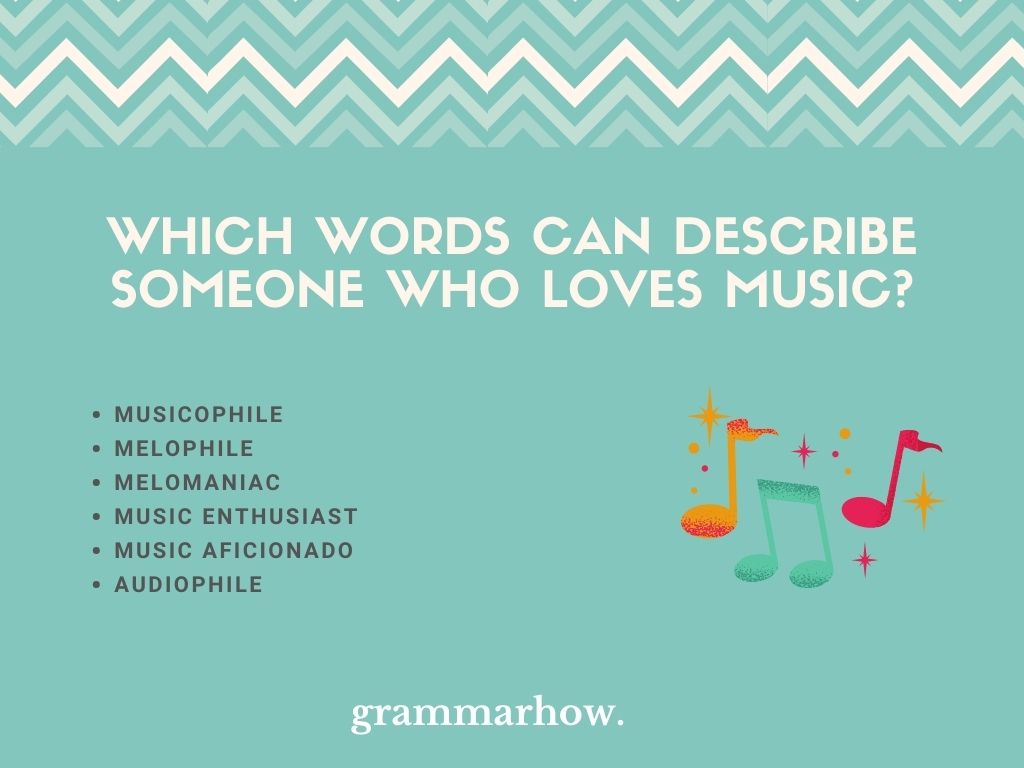-
#1
what do you call someone who listen to many different kinds of music?
Compound word?
Ernesto
Last edited: Sep 6, 2010
-
#2
I can’t think of any word to describe what you mean.
I would say: «He / she has broad tastes in music».
PS: What do you call someone who listen to many different kinds of music?
-
#3
Me neither, Ernesto. I’d say he has broad or wide-ranging or eclectic or catholic tastes in music.
-
#4
SwissPete: What do you call someone who listen to many different kinds of music?
«What do you call someone who listens to many different kinds of music?»
-
#5
Ahhh thanks for the answers and sorry for the gramatical mistakes, I thought I had written it down correctly.
PD:in a finite dependent clause do you use the indicative or subjunctive?
… Who listen or Who listens?
Ernesto
-
#7
SwissPete: What do you call someone who listen to many different kinds of music?
«What do you call someone who listens to many different kinds of music?»
Missed that one, didn’t I?
-
#8
I heard it from a recording, where a guy didn’t know what to call «someone who listen to different kind of music». So he said that
-
#9
I’m still not content with «ecletic». There must be another that everyone uses everyday
-
#10
We did give you other commoner alternatives, Ernesto (broad, wide-ranging).
-
#11
Can the word ‘connoisseur’, meaning someone who knows a great deal about the arts and artistic products, be used here?
-
#12
We did give you other commoner alternatives, Ernesto (broad, wide-ranging).
Ok, ill see if it fits =)
-
#13
Can the word ‘connoisseur’, meaning someone who knows a great deal about the arts and artistic products, be used here?
Well, you could certainly describe someone as a connoisseur of music, Mannoushka. It’s not exactly the same thing, though. That suggests someone who’s extremely knowledgeable about music. Because of the high register of the word connoisseur, in practice it would tend to mean ‘high class’ music, i.e. classical music. (Unless you said, e.g., he’s a connoisseur of rap and gangsta … which sounds kind of odd)
-
#14
I see! Thanks, ewie! I suddenly remembered that a connoisseur can be an expert on a thing or things not necessarily related to art. One hears of ‘wine connoisseurs’, for example.
How about a ‘music buff’? Does this term, too, connote a special taste in music?
-
#15
How about a ‘music buff’? Does this term, too, connote a special taste in music?
No, this only means that someone knows a lot about music.
You can be a music buff if you only like classical music, so it doesn’t express the idea of liking a varied set of styles.
For me there is no word that fits the description, just the phrase «I like / am a person that likes all sorts of music«.
Which is true for me as I can go from Beethoven, to Jewish Klezmer, Arabic Pop to medieval choral music and end up on Italian rap mixed in with shred guitar (you should see my YT playlist ), so when someone asks me what music I like, that’s the answer I usually give (the short phrase; no one-word answer).
-
#16
OK, I give up! There are no words to describe Alxmrphi’s having such varied tastes in music. Thanks, Alxmrphi, as well for opening my eyes to what there is to listen to!
-
#17
what do you call someone who listen to many different kinds of music?
Compound word?
Ernesto
It’s called Eclectic, And no it’s not a compound word. At least I don’t think it is.
Here is the definition of Compound Word. A compound word is formed when two words are joined together to make a new word. Here’s an example of a compound word, the words butter and fly, when you put them together they spell butterfly. You can go to thesaurus.com or dictionary.com to find the answers you seek.
Last edited by a moderator: Aug 11, 2012
Sometimes, we’ll meet someone who is a self-proclaimed music lover. However, there are more ways than just that to describe them, and this article will show you some of the best synonyms for someone who loves music.
Which Words Can Describe Someone Who Loves Music?
There are a few really good choices to describe someone who loves music. We’ll show you what we can do with the following:
- Musicophile
- Melophile
- Melomaniac
- Music enthusiast
- Music aficionado
- Audiophile
The preferred version is “musicophile” because it’s the word that most people associate with a love for music. The “-phile” suffix is common when talking about things that people love, which is why it works so well with the word “music” before it.
Musicophile
So, let’s start with the preferred version and work our way down the list. You can’t go wrong with musicophile when you’re trying to describe a music lover.
A musicophile is someone who loves music more than anything else. We can use the “-phile” suffix here to show their love for it (the opposite of a “-phobia” suffix). It’s a great way to show that someone is a lover of something.
While the word musicophile isn’t strictly recognized by a dictionary, it’s still common for people to use.
Many native speakers like it because of how obvious it is. It makes it clear that the “music” portion of the word is directly related to someone’s love for music rather than focusing on any of the old-fashioned Latin ideas behind certain “-phile” words.
Here’s how it works:
- He’s a self-proclaimed musicophile, and he can’t stop talking about all his new records.
- You’re a musicophile like me! I think that’s why we get on so well.
- I love my husband because he’s a musicophile, even if some of his musical tastes aren’t similar to mine!
Melophile
Since “musicophile” uses “music” to modernize the word, it wouldn’t be fair to include the traditional word “melophile” in this article as well.
A melophile is someone who loves music. Again, the Latin suffix “-phile” shows their love for it. However, this time, we also use the Latin prefix “melo-,” which means “melody” or “song.”
We can use “melophile” whenever we want to show that somebody is a serious music lover. The terms “musicophile” and “melophile” are interchangeable, though some people prefer “melophile” because of its traditional Latin etymology.
Here’s how you might use it:
- I’m a melophile at heart, and I’ll be happy to listen to anything as long as it makes me happy.
- You’re a melophile, and you can tell that by how much you love to just stop and listen.
- He’s a melophile, and I’ve noticed that he just can’t get enough of music when he’s around it.
Melomaniac
Using the same “melo” etymology as above, we might also be able to use melomaniac to describe a music lover.
A melomaniac is someone who is obsessed with music. They will often be happy to admit that in the hopes that they find someone to share their obsession (and love) of music with.
From its Latin roots, we can use the “melody” etymology again. However, this time we drop the “-phile” suffix and use the word “maniac,” which shows that someone is obsessed with something.
We can use it in the following ways:
- I don’t mean to be a melomaniac, but the way you’re playing those tunes is amazing to me!
- He’s a melomaniac, which is part of the reason why I think I love him so much!
- Please be a melomaniac just like me! It would be amazing to have somebody to share my interests with.
Music Enthusiast
If you want a simpler alternative, this might be a good choice for you. It doesn’t use any specific etymology-based words. It’s just two familiar words combined to make a good descriptive term.
A music enthusiast is someone who shares their enthusiasm with music. They will often talk about how much they love all kinds of music, and they’re the people that you would go to if you’re not an enthusiast to find out more about it.
While it’s a two-word variation, it still works really well whenever we want to describe someone’s love for music. We could also apply the term “enthusiast” to any other interest, showing that someone truly loves something.
This alternative’s good because every native speaker will know what it means. After all, “enthusiast” is a common word, and everyone knows it means that someone has a lot of joy and happiness surrounding a certain subject.
You might find these examples useful for when you want to use this:
- She’s quite a music enthusiast, and I’m sure you’ll find plenty of common ground if you just go and talk to her.
- I’m not as much of a music enthusiast as he is, but I do come close!
- You’re just a music enthusiast who can’t get enough of his album! I love that about you!
Music Aficionado
A slightly less simple two-word synonym than above is “music aficionado.” It still works really well, but the Italian word “aficionado” is a little less common compared to “enthusiast.”
Still, a music aficionado is someone who likes to talk about music and share all their knowledge about it. They have all of their knowledge because of their love for music, though some people might think of them as pretentious if they’re not careful.
Typically, people will describe you as an “aficionado” when your passion or knowledge somewhat threatens them.
Many people will use the phrase in a more negative sense, but there’s still nothing wrong with using it to describe a music lover. In fact, it works quite well whenever we want to describe them.
Try out these examples to see if you can make the most of it:
- Without meaning to brag, I’m definitely somewhat of a music aficionado. You should come to me for any queries you might have.
- You’re a music aficionado, and it’s clear that music is your entire life!
- Stop being such a music aficionado because you’re making the rest of us feel bad about our lack of music taste!
Audiophile
We wanted to leave “audiophile” for last because it’s not quite what we’re looking for. It’s still a good choice in certain cases, but an audiophile’s love for music comes in a different way.
An audiophile is someone who loves sound and audio quality. They will often strive to get their music or sounds played in the highest quality, and they won’t settle for anything below that. The slightest bit of grain or fuzziness in a recording could put off an audiophile.
We thought it was a good inclusion because it’s another use of the “-phile” suffix. This time, we use “audio” as the prefix to show that they’re in love with audio quality rather than strictly music itself.
A love for music is still an extension of the word, though. Many audiophiles do love music, just like melophiles.
Here are some great examples of how to use it:
- I’m an audiophile, which plays really well where I work because of all the sound technicians I get to talk to!
- You’re not as much of an audiophile as you think you are if you’re okay using those cheap headphones to listen to your music!
- He’s an audiophile, which is most likely why he went into presenting on the radio.
Is It “Musicphile” Or “Musicophile”?
You might have noticed that we used “musicophile” as the preferred term above. Of course, this brings the spelling into question, and it would help to understand how we spell it.
“Musicophile” is the correct spelling to use when talking about a lover of music. The “-phile” suffix means that somebody loves something, and we are talking about their love for “music,” which becomes the prefix.
However, that does not explain why there’s an extra “O” letter in the middle of the word.
We include this because we want it to be smooth and easy to understand. Many “-phile” words have a vowel before the suffix is included, which helps readers understand what’s going on.
Since “musicophile” isn’t a technically correct word (it’s one that we can use to talk about music lovers, but it’s not officially recognized), it’s up to us how we want to spell it.
Here are some other “-phile” words to show you the importance of the vowel before the “-phile:”
- Bibliophile (lover of books)
- Audiophile (lover of sound design)
- Cinephile (lover of movies)
What Is The Difference Between A “Musicophile” And An “Audiophile”?
As we’ve shown you previously, there is a fundamental difference between a “musicophile” and an “audiophile.”
A musicophile is someone who adores music. They love to listen to it, and they find joy in it (as well as other emotions related to the genre). An audiophile is someone who adores the sound design of music, often chasing after better equipment to make music sound even better.
While musicophiles love music, audiophiles prefer the audio quality. They will chase after the equipment and technology needed to make all things sound better, and it doesn’t always apply to music.
Other interests of audiophiles include:
- Podcasts
- Webcasts
- Radio presenting
As long as there is a sound system involved, audiophiles will love it.
Martin holds a Master’s degree in Finance and International Business. He has six years of experience in professional communication with clients, executives, and colleagues. Furthermore, he has teaching experience from Aarhus University. Martin has been featured as an expert in communication and teaching on Forbes and Shopify. Read more about Martin here.
That person appreciates good music.
appreciate: 1. transitive verb If you appreciate something, for example, a piece of music or good food, you like it because you recognize its good
qualities.e.g.
«Anyone can appreciate our music.» (Collins Dictionary)
You could also say that the person has eclectic taste or even that the person is an eclectic (using the word as a noun).
eclectic: (adjective) eclectic 1.deriving ideas, style, or taste from a broad and diverse range of sources. «her musical tastes are
eclectic»eclectic: (noun)
A person who derives ideas, style, or taste from a broad and diverse
range of sources. (Oxford)
Example sentences also from Oxford:
‘But they are not just reactionary eclectics; they think they can twist and recombine architectural history in fresh and original ways that would have been unthinkable before modernism wiped the slate clean.’
‘Douglas is the king of jazz’s current crop of eclectics: He’s the kind of guy who shows up at a Jewish wedding with a tango band and proceeds to play Bjork covers.’
‘The two strongest objections each approach levels at the other is the claim that eclectics are undisciplined, and that traditionalists are stagnated.’
Английская лексика на тему музыки
1. Questions about music
Do you like music? — Вы любите музыку?
Can you play any instrument? — Ты умеешь играть на какому-нибудь инструментах?
Do you like singing? — Ты любишь петь?
What is your favourite type of music? — Какая ваша любимая музыка?
What genre of music do you listen to? — Какой жанр музыки ты слушаешь?

2. Actions
to sing along
to sing karaoke
an earworm — навязчивая мелодия
It’s just an earworm. — Это просто навязчивая мелодия.
to get stuck in your head
to have taste in music — иметь вкус к музыке
to be tone deaf — медведь на ухо наступил (быть глухим)
set my favourite song as a ringtone — установить мою любимую песню в качестве мелодии звонка
to own a lot of vinyl — иметь много виниловых пластинок
to own a lot of records — иметь много записей
to own a lot of physical albums — иметь много альбомов (физических альбомов)
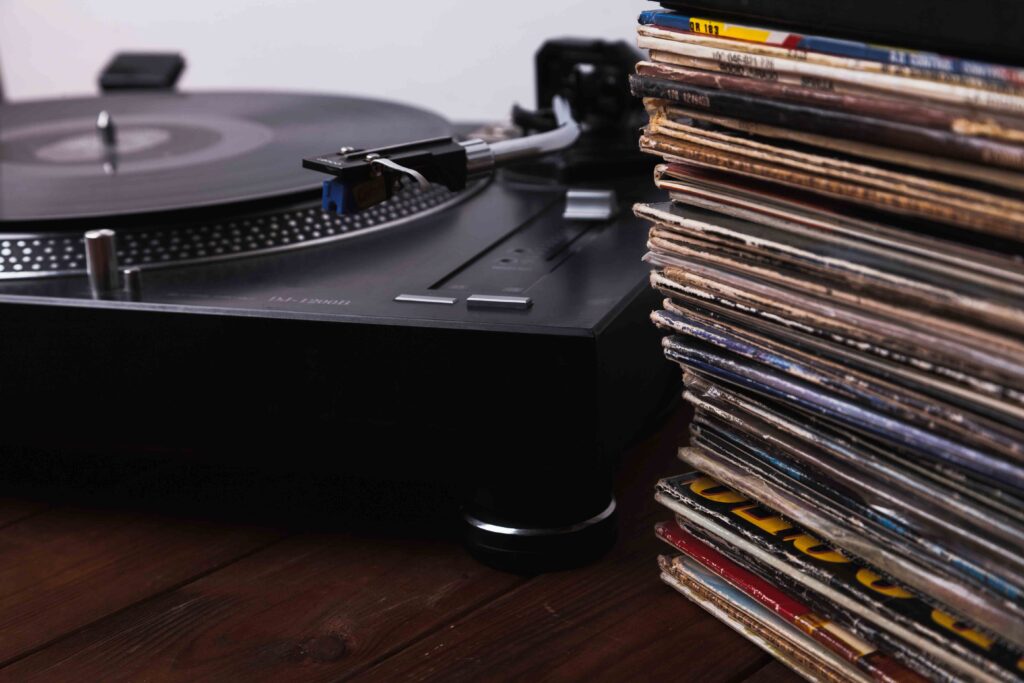
3. Words to describe the type of music
fast tempo — быстрый темп
The song is so upbeat.
a complex song — сложная песня
heavy music — тяжелая музыка
loud music — громкая музыка
relaxing music — расслабляющая музыка
soft music — мягкая музыка
piercing music — пронзительная музыка
hurt your ears — навредить твоим ушам
rhythmic music — ритмичная музыка
uplifting music — воодушевляющая музыка
melancholic music — меланхолическая музыка
catchy music — запоминающаяся музыка
lively music — живая музыка
harmonic music — гармоническая музыка
make you fell better (happier) — делать тебя счастливее, чувствовать себя лучше
It has a pleasing melody. — У него приятная мелодия.
That sounds awful. — Это звучит ужасно.
It makes my ears hurt. — У меня болят уши.
That’s too much of noise than music. — Это шум, а не музыка.
It heals. — Она исцеляет.
It stirs up my imagination. — Она будоражит мое воображение.
It’s rejuvenating. — Она делает моложе.


4. Концерты
a concert — концерт
a gig — концерт
live show — прямой эфир

5. Люди
a musician — музыкант
a band — музыкальная группа
women performers — женщины-исполнители
a vocalist — вокалист
a singer — певец
an artist — исполнитель
a music lover — любитель музыки
a music buff — любитель музыки
a music expert — музыкальный эксперт
to pick certain tunes — выбирать определенную мелодию
to develop a deeper understanding of music — развить более глубокое понимание музыки
to explore different genres of music — исследовать разные жанры музыки
an album — альбом
a record — запись
vinyl — виниловая пластинка
a vinyl lover — любитель виниловых пластинок
CD
physical music

6. Составляющие музыки
a tune — мелодия
to play a tune — сыграть мелодию
rhythm — ритм
a good track (song) — хороший трек (песня)
catchy beat — запоминающийся ритм
to like a beat of that song — любить ритм этой песни
fast tempo — быстрый темп
slow tempo — медленный темп
the sense of rhythm — чувство ритма
a downtempo song — тихая (спокойная) песня
7. Успех
a record label — звукозаписывающая компания, студия звукозаписи
a small record label — небольшая студия звукозаписи
to have a massive hit — иметь огромный успех
to have a huge (giant) following/fan base — иметь огромную (гигантскую) базу подписчиков / фанатов
to getting signed by a record label — подписать контракт с лейблом
Many girls are head over heels in love with him. — Многие девушки по уши влюблены в него.
head over heels — по уши
8. Top 10 genres of Music Industry
8.1. Electronic Dance Music — Электронная танцевальная музыка
be produced by DJs
add dozens of tones to a piece to create unique music
hear them in clubs
was known in the form of Jamaican dub music
8.2. Rock Music
has been rocking the world since the 1950s
started actually around string instruments
Its loud and strong beats make it popular among the youths.
Rock bands:
Metallica, Pink Floyd, Nirvana, The Doors
8.3. Jazz
has its roots both in the West African and European culture
Originating in the late 19th to early 20th century.
Women performers:
Ella Fitzgerald, Betty Carter, Abbey Lincoln and Ethel Waters
8.4. Dubstep — Дабстеп
falling in the electronic music genre
8.5. Rhythm and Blues — Ритм-энд-блюз
Vocalists:
Rihanna, Mariah Carey, Beyoncé, Usher and the legendary Michael Jackson
be a combination of hip hop, funk, dance, pop and soul focusing on themes like relationships and freedom
8.6. Techno — Техно
the use of technology today has greatly enhanced the quality of techno style music and popularizing it among people day by day
8.7. Country Music — Кантри-музыка
to be a popular genre of American music which originated in the 1920s
having its roots from American folk and western music
using simple forms of instruments ranging from electric and steel guitars to drums and mandolin or mouth organ
Music singers:
Kenny Rogers, Shania Twain, Johnny Cash Taylor Swift
8.8. Electro — Электро
It is a blend of hip hop and electronic music. — Смесь хип-хопа и электронной музыки.
using a drum machine, vocoder and talkbox
Notable artists who have been into this form of music:
Arthur Baker, Freeez, Man Parrish and Midnight Star
8.9. Indie Rock — Инди-рок
It was originated in the 1980s and has gradually changed the music industry.
8.10. Pop Music — Поп-музыка
This form can include any form of music ranging from urban and dance to rock, country and Latin.
Instruments highly used are electric guitars, synthesizer drums as well as bass.
8.11. Classical Music
J.S. Bach — St Matthew Passion
Tchaikovsky — Symphony No. 6
Beethoven — Grosse Fuge
Mozart — Requiem
8.12. K-pop
Kpop is Korean popular music.
9. Types of musical instruments
9.1. Percussion instruments — Ударные инструменты
the piano, the xylophone, the cymbals
9.2. Wind instruments — Духовые инструменты
the saxophone, the flute, the trumpet, the clarinet
9.3. Stringed instruments — Струнные инструменты
the guitar, the violin, the cello
9.4. Electronic instruments — Электронные инструменты
the Xth Sense
9.5. Membranophones — Мембранофоны
Cylindrical drums, barrel drums, hourglass drums
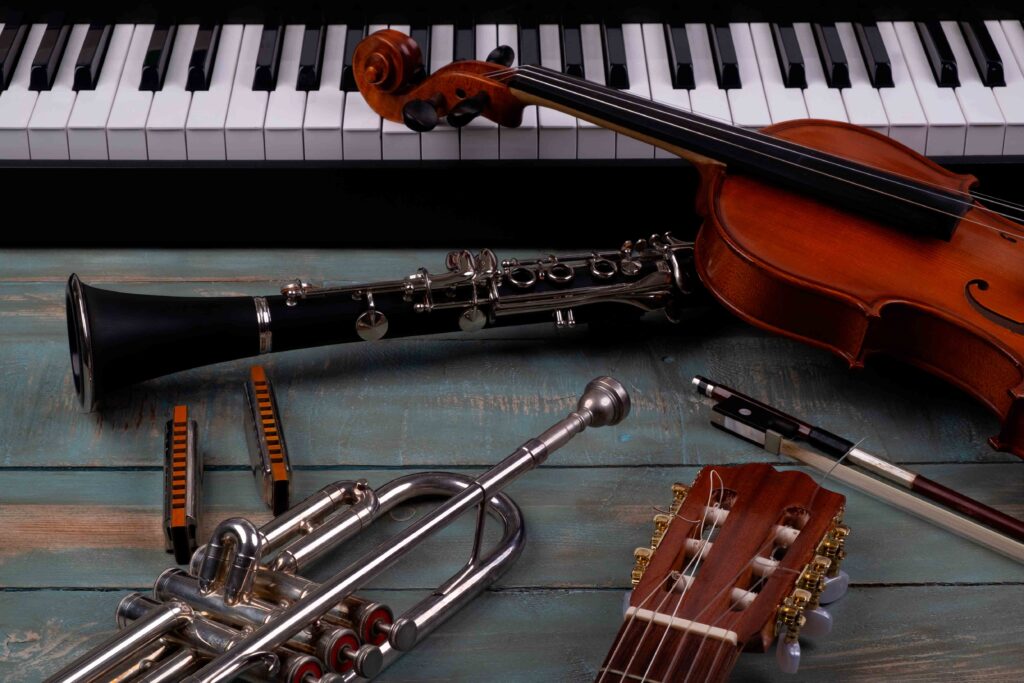
10. Apps for listening to music
Amazon Music (free/subscription)
Spotify (free/subscription)
Apple Music (subscription)
YouTube Music (free/subscription)
Bandcamp (individual purchases)
Shazam (free)
11. Benefits of Learning a Musical Instrument
11.1. Creativity
produce your music out of artistry
11.2. Memory Skills
can help exercise your brain
11.3. Boosts Your Confidence
need to perform in front of your fellow students, teachers, or family and friends
11.4. Coordination Skills
stimulating your brain and body to communicate with your mind, hands, and eyes
11.5. Maths
enhancing the sense of rhythm, beat, and scale. These are critical factors that stimulate your problem-solving skills.
11.6. Improved Academic Achievements

Репетитор английского языка
Whilst you need to have a broad music vocabulary so that you can answer questions on any aspect of the topic, it’s a good idea to pay particular attention to words and phrases related to your favourite genre of music. There are just so many different types and styles of music that it would be poor use of your study time to try and learn vocabulary for them all.
Most of us enjoy listening to music, or even performing ourselves, which makes music questions fairly easy to answer, especially if it’s about your favourite band, singer or song.
The subject of music could come up in any part of the IELTS exam and this list of music vocabulary is equally relevant for Writing, Speaking, Reading and Listening questions.
This page contains over 130 common words and phrases, together with an explanation for each one and a sample sentence to show it in context. This will help you to learn how to use it correctly.
Don’t try to learn them all. Look at my suggestions below as to the best way to use the list.

To help you create the best possible answers, I’ve included four things here:
- IELTS-style questions on the topic of music
- Sample answers
- A list of common music vocabulary with definitions & sample sentences
- Links to online reading and listening resources
You’ll find
PDF downloads of both the questions and sample answers and the vocabulary list
at the bottom of the respective sections.
The
questions relate to the Speaking test because this part of the exam offers the
broadest range of possible questions on this topic. They give the best
opportunity for me to demonstrate the vocabulary and for you to practise using
it.
I’ve
included IELTS-style questions and answers for all three parts of the Speaking
test. I’ve highlighted keywords and phrases in bold.
You’ll find
these words and phrases, and many others, in the vocabulary list beneath. There’s
also an audio to listen to the pronunciation.
Finally, at
the bottom of the page, I’ve added links to topical articles, short videos and
podcasts that will help you to improve both your music vocabulary and your
reading and listening skills.
IELTS-Style
Speaking Test Questions and Answers
Common music vocabulary
is highlighted in bold.
Part 1
1) What types of music do you like to listen to?
It depends on what mood I’m in but
generally, I like easy listening
although I am a massive fan
of country music and play
this genre more than any
other.
2) Are there any kinds of music that
you dislike?
I’m not really into jazz. It’s just not my taste in music, especially when
the musicians improvise. It sounds like they are
all playing different tunes
and there’s no harmony.
3) Do you ever go
to music gigs?
I love listening to live music and go to local gigs at least once a month. I only go
to concerts by top bands once in a blue moon as I live a long way from the big music venues.
4) Have you ever been in a music group or a band?
I
was a vocalist in my church
music group for several years
and also sang in the choir
when I was in school.
5) Does your country have a
traditional type of music or dance?
Folk music and Morris dancing are both traditional
in the UK. The music for this type of dancing is often played on the fiddle and accordion, with a drum
to give the dancers a good rhythm
and beat.

Part 2
Describe your favourite music
group or band.
You should say:
- what group or band is it
- what type of music they play
- how long you have been listening to their songs
and explain why you like this music
group or band.
I
like many different groups but
the one that comes top of my list has to be Bruce Springsteen and the E Street
Band.
I
first heard their music way back in 1980. I had a boyfriend who had one of their
albums and I was a fan from the first track I heard. I’ve been
listening to them ever since. The song
that really hooked me was “The River”. It’s still one of my favourite songs of all time. It has a slow,
haunting melody and beautiful
lyrics.
In
those days, very few people in my country had heard of Bruce Springsteen but
all these years later his band
are often on tour here and they
play sellout concerts around the world. His
nickname is “The Boss” which shows how much people respect him and his great
music.
Although
the E Street Band are essentially a rock
band, there are strong influences of folk, rock and roll, blues
and country in their music
which helps then appeal to a wide audience.
I
was once given two tickets to one of the band’s
concerts at Cardiff Arms Park
rugby stadium; a great venue. They were a Christmas present and I took my sister along with
me. It’s the only time I’ve seen them at a live
gig but it’s an event I shall never forget. What a wonderful experience.
We sang along to all the songs.
The
highlight of the show was when they performed “The River. At the end, the band stopped playing and Bruce
led the audience in singing the
chorus over and over again.
It was amazing and a very special moment. I actually found it quite moving as
that was the song that had
started me as a fan all those
years ago and there I was singing it with him. There was silence when it
finally ended and then the applause
started and went on for what seemed like forever.
It’s
hard to put in words why I like Bruce Springsteen and his band so much. I think it’s because their lyrics are so real while most of
the songs have a strong melody that stirs your soul. That’s
the best way I can put it.
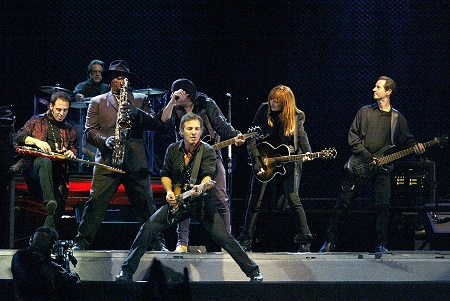
Part 3
1) Is it important to listen to
music with other people?
I think that listening to
music can be both a social experience and a personal one. Young people in
particular like chilling out
with friends while listening to their favourite tracks. There’s also something special about attending a live gig with your mates and singing along to the familiar tunes with all the other fans.
I’ve only ever been to a
couple of music festivals but
what I remember as much as the bands and
the fantastic music was the atmosphere of the events and that was created by all
the people who were there.
On the other hand, you can
enjoy music just as much when listening on your own. The fact that everywhere
you look there are people walking around wearing earphones or headphone
seems to be proof of this. So, in conclusion, I would say that while it’s nice
to share music with others, it’s not especially important.
2) Why
do you think older and younger generations prefer different types of music?
That’s
something I’ve never really thought about but I suppose it’s because they grew
up listening to different types of music as styles change over time.
Speaking
for myself, there are many talented new bands
and singers that I enjoy listening to. I often buy their albums and download
them onto my MP3 player, but
there’s nothing quite like the music I loved when I was in my teens. Perhaps it’s
as much to do with the memories it brings back as the music itself.
That’s
how I see it and I guess that many other people probably feel the same.
3) Do you think that music should
be a compulsory subject in schools?
I
do believe that music should be taught in schools. This is for several reasons.
Firstly,
it’s important to develop children’s creativity and music is a great way to do
this. They should be encouraged to learn to play a musical instrument, but it’s valuable if they just enjoy learning
and singing a few songs
together.
Secondly,
making music is an excellent way of teaching youngster how to work together in
a fun way and most of them enjoy performing to their friends.
Finally,
most schools put on concerts
and other musical performances. Taking part in these gives children confidence and
they are an important part of the curriculum.
While
older children may drop the subject for exams, having school choirs and orchestras provides
other opportunities for them to continue their interest in music.
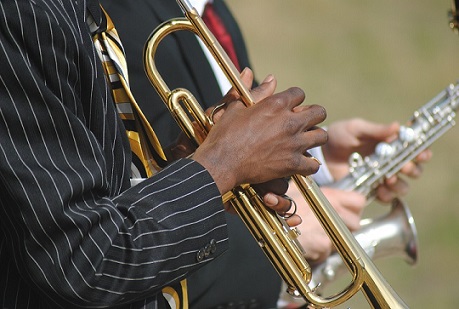
Click this link to get a PDF download of these practise questions & sample answers.
Download PDF Now
Music Vocabulary
* Important
- Do not try
and learn this list of music vocabulary.
- Identify
the vocabulary you find useful for answering practise questions about this topic.
- Record
these in your vocabulary notebook and practise using them regularly.
I recommend that you create
your own answers to the Speaking questions on this page. You will find many
other IELTS-style practise questions by searching online.
For help on how to learn
vocabulary, what to learn and how to record it, visit these pages:
How to Learn Vocabulary for
IELTS
Top 6 Types of IELTS
Vocabulary & Topic Word Lists
Music Vocabulary – Common Words & Phrases
Music Vocabulary Set 1: Key definitions
Set 1: Music genres
There are
many different styles of music around the world. These are some of the
mainstream genres but do add others to your own music vocabulary list if there
are particular styles you like that aren’t included here.
music genre – a distinct type or style of music
— My favourite music genre is rap.
pop – popular music; music liked by a
broad range of the population
— Pop songs are enjoyed by lots of different types of people
because they have a good rhythm, a catchy melody, and are easy to remember and
sing along to.
rock music
– music that is based on amplified instruments, especially the electric guitar
and electric bass, and characterized by a strong bass line and strong rhythms
— The Rolling Stones play some of the
best rock music ever written.
heavy metal – a type of highly amplified
harsh-sounding rock music with a strong beat, characteristically using violent
or fantasy imagery
— I like some rock music but find heavy metal a bit too loud.
rap – a
type of music in which the words are not sung
but are spoken in a rapid, rhythmic way
— Whilst I’m not a great fan of rap music, I do think it’s amazing how they speak so fast and
remember the words.
country music – a
form of popular music originating in the rural southern US. It is a mixture of
ballads and dance tunes played characteristically on fiddle, banjo, guitar, and
pedal steel guitar.
—
There’s a great country music venue
in my town where everyone dresses up as cowboys when they go to gigs.
jazz – a style of music that is generally
loud and rhythmic, where the musicians often make the music up as they go along
—
Louis Armstrong is still a popular jazz
musician many decades after his death.
reggae – a form
of music with a distinct beat that originated in Jamaica and is still
associated with the Caribbean
— Bob Marley was the first internationally known reggae musician.
blues – African-American
music that expresses grief or sorrow about injustice and a longing for a better
life
— Did you know that the blues
is named after the expression ‘to feel blue’ which means to be sad or
depressed?
Music Vocabulary Pronunciation
traditional music – songs and tunes particular to a country or region which have been performed over a long period of time, usually several generations
— Traditional music is part of our culture and should be preserved.
folk – traditional music which included
songs written a long time ago and new songs written in the old style
—
We have some talented young folk
musicians in my country who love performing songs from the old days and writing
new folk songs for our generation.
classical music – a form of music developed in Europe mainly in the 18th and 19th centuries by musicians highly skilled in musical composition
— I find that classical music
really stirs up the emotions and I particularly enjoy listening to Beethoven and Bach.
opera – a
musical play, often very dramatic, in which most of the words are sung
— I’m not a fan of opera
as I really don’t like the style of singing.
musical – a play or film that
uses singing and dancing in
the story but also includes a lot of spoken dialogue
— Although there are lots of great new musicals being written, I still love West Side Story the best.
instrumental music – music where you
just hear instruments playing and there is no singing
— I’m not happy when they play instrumental music on my favourite
radio station as I like to be able to sing along the lyrics.
easy listening
– a type
of music that is not complicated, is pleasant to listen and doesn’t need much
of your attention
— When I
get home in the evening I put on some easy
listening to help me relax after a busy day.
background music – music that is playing while something else is happening
— My friend likes to have background music on while she’s
studying but I need a quiet place to work.
Music Vocabulary Pronunciation
Music Vocabulary Set 2: Musical instruments & playing music
If there are any traditional musical
instruments popular in your country that you might want to talk about, add them
to your own music vocabulary list.
instrument – something you play to make music
Some common instruments:

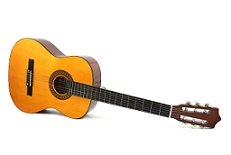
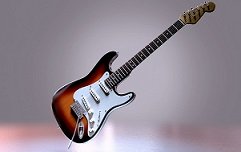
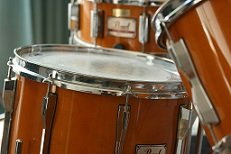
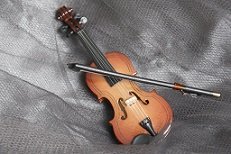
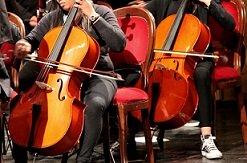

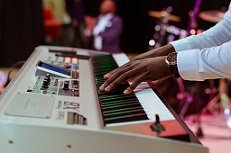
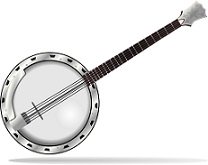
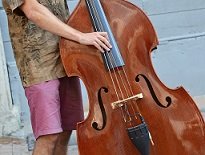

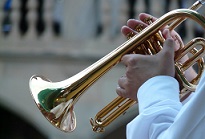
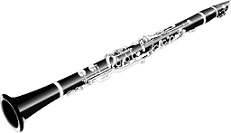
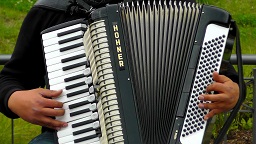
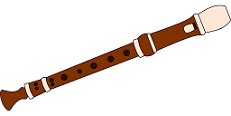
Music Vocabulary Pronunciation
traditional
instruments – a type of instrument that
has been played for many generations or that was popular in the past,
often unique to a country or region
— A sitar is a
traditional Indian musical instrument.
to take up (a musical
instrument) – to
begin learning a musical instrument
— I’m going to take up the guitar.
to read music – to understand and follow written
musical notes
— I’m so glad I learnt to read music when I had piano lessons as
a child because it really helps me now that I sing in a choir.
to play by ear – to play without reading the
musical notes
— Many talented musicians can’t even
read music and only play by ear.
talented
– to be naturally skilled at something
—
I never got the hang of playing an instrument even though both my
parents are talented musicians.
to
be musical – have a
skill in or a great liking for music
— My friend Sally is very musical and can play several different
instruments.
self-discipline – the ability to make yourself do things you know you
should do even when you do not want to
— You need
a lot of self-discipline to learn
the piano as you have to practise every day and play boring scales.
sense
of accomplishment – to feel
like you’ve achieved something you can be proud of
— Bernie
felt a real sense of accomplishment
at passing his Grade 2 flute exam.
vocals – a part of a piece of music that is sung
— My parents met in a band. Dad was a guitarist and Mum sang vocals.
Music Vocabulary Pronunciation
Music Vocabulary Set 3: Musicians
musician – a person who plays a musical instrument, especially as a
profession, or is musically talented
— It was Jai’s ambition to be a professional musician and play in a famous
orchestra.
bass player
– someone who plays the bass
conductor
– the person who leads the orchestra
guitarist
– someone who plays the guitar
keyboard player
– someone who plays the keyboard
pianist
– someone who plays the piano
drummer
– someone who plays the drums
cellist
– someone who plays the cello
violinist
– someone who plays the violin
vocalist
– someone who sings
— Phil Collins was unusual in being both the drummer and lead vocalist in a band, the famous Genesis.
choir
– a group of singers singing together
— Lulu really enjoyed singing in the choir, especially when they performed at concerts.
orchestra – a large group of musicians who play many
different instruments together and are led by a conductor
— Jason was delighted when he was asked to play violin in
the school orchestra.
band – a group of people who
sing together and also play instruments
— I was so excited to be asked to play
bass guitar in the new band.
group – a collection of people
who sing together but do not necessarily play instruments
— All the groups performing
in the contest were excellent and it was hard for the judges to pick the best.
composer
– a
person who writes music, especially as a professional occupation
— My favourite classical composer is Mozart.
Music Vocabulary Pronunciation
Music Vocabulary Set 4: Live music
a performance
– the act of entertaining other people by dancing, singing, acting or
playing music
—
The choir gave a wonderful performance at my sister’s wedding.
a gig
– a performance of a band
— My new band is playing their first gig at the weekend.
a show
– a performance,
especially involving music
— I’m
going to my kid’s school this evening to watch them perform in a show.
live
music – music
performed in front of an audience
— We have many clubs in my city and
I often go along with friends to listen to live
music.
Collocations:
- live show
- live
performance - live gig
music festival – an organized event, typically lasting several days, featuring
performances by various musicians, singers and groups
— I try to go to at least one music festival each summer.
concert – a performance of music by one or more
musicians or singers
— My orchestra is going to perform at a concert organized to raise money for charity.
stage
– a raised platform on which musicians, actors or entertainers
perform
— I felt nervous when I walked out on stage and saw the large audience waiting to hear me sing.
venue – the place
where a public event such as a concert happens
— The disused warehouse was
the perfect venue for a rock
concert.
Music Vocabulary Pronunciation
Music Vocabulary Set 5: Recorded music
recording / recorded music – music that has been
stored on a record, CD, computer, etc., so that it can be heard again
— I
have recordings of many of my
favourite bands stored on my computer.
MP3
player – an electronic device that can store and play digital audio files
— I always carry my MP3 player with me so that I can listen
to music whenever I want to.
headphones
/ earphones – an electronic device that fits over or in the ears for
listening to music
— I wear earphones
to listen to music on my MP3 player while I’m out jogging.
album – a collection of recordings issued as a single item on
CD, record or another medium.
— I can’t
wait for my favourite band’s new album
to come out.
to download tracks – to obtain music from the internet
— I heard a great band at the gig
last night and I’m going to download
some of their tracks.
speakers
– a piece of electrical equipment for playing recorded sound, through which the sound is played
— The jazz album I got for my
birthday sounds amazing
through my new speakers.
Music Vocabulary Pronunciation
Music Vocabulary Set 6: Describing music &
songs
a song
– a
usually short piece of music with words that are sung
— My favourite Ed
Sheeran song is “Thinking Out Loud”.
lyrics – the
words to a song
— Leonard Cohen wrote some
of the best lyrics of all time and
many artists still perform his songs today.
a melody – the main tune in a piece of music that is often played or sung more than once
— I had
trouble picking up the melody of the
new piece we started learning at choir rehearsal today and will practise it at home.
a tune
– the musical part of a song, especially one that
is pleasant and easy to remember
a catchy tune – a tune or a song that’s easy to
remember and stays in your mind so that you find yourself humming or singing it
— I heard a really catchy
tune of on my kid’s TV programme this morning and I’ve been humming it all
day.
piece of music – a musical composition, especially but not necessarily an
instrumental one
— My piano teacher has given me a
new piece of music to learn before
my next lesson.
taste in music – the music someone likes
— My boyfriend and I have the same taste in music and go to live gigs
whenever we can.
rhythm
– a regular, repeated pattern of sounds
— I love the rhythm of
reggae music.
beat
– a characteristic
rhythm in some types of music
— Rap music has such a distinctive beat.
harmony – a pleasant musical sound made by different notes being
played or sung at the same time
— One of
the reason I enjoy country music so much is because many songs have lovely harmonies.
Music Vocabulary Pronunciation
to be out of tune – to play or sing slightly wrong notes
— My dad likes to sing along the radio but is so out of tune that it sounds terrible.
to be in tune – to play or sing with the correct pitch
— Before the performance, the guitarist tightenend the strings of his guitar so that it was in tune.
to have a great voice – to sing well
— I think my friend should enter the singing competition as she has a great voice.
to be tone deaf – to be unable to distinguish the different notes in music
— I’d really like to able to sing but I’m tone deaf so I don’t think there’s much chance.
chorus – a regularly repeated line or group of lines in a song
— The choir sang lots of well-known songs and encourages the audience to sing along to the choruses.
upbeat – cheerful or lively
— If I’m feeling sad I put on some upbeat music and feel better almost at once.
nursery rhyme – a simple traditional song or poem for children
— I can still remember many of the nursery rhymes I learnt as a child.
lullaby – a quiet, gentle song sung to send a child to sleep
— If my baby wakes up in the night I just sing him a lullaby and he soon goes back to sleep.
sing to sleep – to make someone feel sleepy by sing them a gentle song
— My mum used to sing us to sleep when we were young.
Music Vocabulary Pronunciation
Music Vocabulary Set 7: Music & the emotions
passionate –
to feel strongly about something
— I’m passionate about playing the saxophone.
to cheer
up – to cause to feel better
— Upbeat music always cheers me up if I’m feeling down.
relax / chill
out – to become less tense or
anxious
— After a stressful day at
work, I lie in the bath listening to classical music as this helps me to chill out.
energise
– to
make someone feel energetic or eager
— Reggae music energises me so that’s what I Iisten to
when I feel sluggish and need motivating.
Music Vocabulary Pronunciation
Music Vocabulary Set 8: Other music vocabulary
rock band – a group of musicians that play rock
music
— One of the great things about
living in Manchester is that all the top rock
bands perform here.
pop star – a famous singer or musician who performs
pop music
— Many teenagers have the dream of
being a pop star as they want to be rich and famous.
famous – known about and recognized by
many people
— The Beatles are one of the most famous bands ever to have existed.
frontman –
lead singer of a band
— Roger Daltrey has been the frontman of The Who for over 50 years.
fan – a person who admires, supports or follows a person, band or team
— I’ve always been an Elvis Presley fan even though he died before I was born.
huge
following – to have a large number of fans
— Modern pop stars have a huge following
which they communicate with on social media.
to go on tour – to go on a planned series of performances around a region
or country
— I hope my favourite band go on tour again soon as they put on an
amazing live show.
sellout – a performance or sports event for which
no more tickets are available because it’s so popular
— The Bruno Mars concerts were a sellout at every venue on the tour.
record company
– a business that makes and sells musical recordings
— Our band
is getting well-known across the country and we’re hopeful of getting signed by
a record company.
record label
– a brand or trademark associated with the marketing of music recordings and
music videos
— You know you’ve hit the big time if you get signed up with
one of the big record labels such as
Sony.
hit the big time
– to become successful and/or famous
— After winning the TV talent show, Shelley hit the big time and was soon singing
in huge venues around the world.
a hit – to be popular; a record that sells lots of copies
— “Happy” was a massive hit for Pharrell Williams.
Music Vocabulary Pronunciation
the charts – a list of individual songs or musical performances ranked in order of number of sales or downloads over a specific period of time which indicates their popularity
— Ariana Grande’s new record is brilliant and I’m not surprised it’s made it to No.1 in the charts.
to sing along to – to join in singing
— My favourite songs in the charts are always the ones you can sing along to.
a sing-song – to sing informally, often with other people
— I have wonderful memories of my gran playing popular songs on the piano at family get-togethers and everyone joining in for a sing-song.
music-lover – someone who really enjoys listening to music
— I can’t say I’m a great music-lover although I do enjoy listening to the radio when I’m driving.
applause – approval or praise expressed by clapping the hands together
— The applause continued even after the band had left the stage.
- a round of applause – an outburst of clapping from an audience to show approval
— The audience gave the choir an enthusiastic round of applause as they came on to perform.
to be into / not into – to be interested in or involved with / to not be interested in
— I’m really into folk music but not into jazz at all.
to improvise – create and perform music, drama or verse spontaneously or without preparation
— I don’t enjoy listening to jazz when it’s improvised as it sounds like the musicians are all playing different tunes.
once in a blue moon – hardly ever
— I’m definitely a music-lover but only go to live gigs once in a blue moon.
Music Vocabulary Pronunciation
Click this link to get a PDF download of this list of music vocabulary.
Download PDF Now
Ways to Improve Your Music Vocabulary
One of the best
ways to improve your music vocabulary is through reading. Watching topic related YouTube
videos and listening to podcasts is also hugely beneficial.
Here are some
online resources I recommend.
Music Articles
These online publications contain music news and related articles. Most music genres have their own publications so search for those that particularly interest you, e.g. «Jazz magazines» or «Jazz articles».
Pitchfork
BBC News — Music
The Guardian — Music
TED Talks
I love TED Talks. They are short videos
with a powerful message and are generally very interesting. They’re ideal for
improving your vocabulary and give valuable listening skills practise.
Search TED Talks — Music to help you improve your music vocabulary. It will take a bit more searching to find something relevant than with some other topics but it’s worth seeing what you can find.
All Topic Vocabulary
Like this page?
-
Home
-
IELTS Vocabulary
-
Music Vocabulary
›
›
-
Back To Top

